Articles of 2007
Shane Mosley: Sneaking back into the big time?
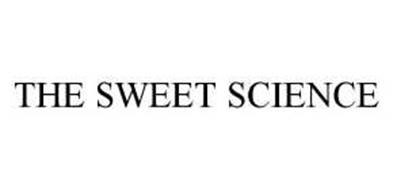
We all know what Shane Mosley’s going to say, most of the time, if the subject of inquiry put to him is his boxing career. He’s going to try and stay at welterweight because he (rightly) believes at that weight (147ish at weigh-in) he’s more than competitive. At 154 – jr. middleweight – he’s just too bulky, too often caught in the transit lounge of prime hitting, not quite inside and not yet all the way outside. The raw speed he utilized as the lightweight champion doesn’t manifest itself much above 155. You can see Mosley, as he fights at jr. middleweight trying to be quick, powerfully decisive, instead of reflexively effective, the punitive character of his darting power looking more like telegraphed thrusts.
We know he’s not entertaining retirement from the ring, unless he’s literally beaten into submission by Luis Collazo on Saturday night. The phrase he’s been using is that he “cannot see that far down the road” for he loves the life of disciplined training and being committed to personal excellence. For Shane Mosley boxing is about the culture of personal improvement. That hasn’t changed since he told us that just before erasing Aussie Shannon Taylor in spectacular form. Punch for punch, that 2001 WBC welterweight defense was as pure a performance as Mosley produced at 147. Smiling and showing that famous row of orthodontic true teeth, Mosley prefers we understand that he’s a man who does not wish to retire to California and contentedly play promoter to ring stars. That vision never comes into focus for the 36-year-old, four-time world champion.
Even if fighting while trying to build a promotion conglomerate seems like an irresistible combination because – so far – his fellow Golden Boy partners, principally Oscar De La Hoya along with Bernard Hopkins and Marco Antonio Barrera can’t get final separation from their ring careers either. Back with his father Jack as his cornerman, Shane Mosley’s trying to make money, selecting the best money grossing fights possible at welterweight. No news there! Which is too say, he’s trying to be his own man, justifying his place among the Golden Boy elite and searching for a few more defining victories for what he sees as a Hall of Fame career.
He also admits, turning rationalizing honesty into momentary confession, that there are a lot of old-ish name fighters, with and without titles, who make financial sense for a guy like Mosley. Sure there are young guns like Antonio Margarito and Ricky Hatton and Miguel Cotto but there are also guys like Cory Spinks and even Kostya Tszyu. Why not throw in Floyd Mayweather Jr. Yes, he’ll wait for his partner Oscar De La Hoya to try his luck with the brilliant Michigander, on May 5 at the MGM Grand, in Las Vegas. Mosley’s more than willing to take the leftovers either way. Yet, get Mosley warmed up and he’ll eventually get around to the refrain of “becoming the best pound-for-pound once again.”
No one really believes that part of the Mosley monologues. Hardly as irritating as Evander Holyfield saying he wants to once again “become the undisputed heavyweight champion of the world” or Vitali Klitschko reminding us ad nausea, “I definitely want a rematch with Lennox Lewis… That’s my ultimate fight.” Mosley’s only shot at bypassing reason, genetics and probability – to hear him say it – would be a win over Floyd Mayweather Jr., a Floyd Mayweather Jr. coming off victory over Oscar De La Hoya. No, few are going there; few think in such terms. Still, you get the idea that should Mosley put up a credible and winning stand against Luis Collazo this Saturday night, for the WBC welterweight title (interim title) why not call out Mayweather? Why not challenge him to a catch-weight, say a 150 lb. showdown, for all the metaphorical marbles.
Think of how Mosley could ride up to defend the dented honor of Golden Boy Promotion. Think of how easy it would be to call out Mayweather, since Mosley will be onsite, floating around for fight week anyway, literally in the rhetorical mix. Incredibly, Mr. Mayweather has been calling De La Hoya overrated, cheap, plastic, a guy who’s afraid of him, one given to wearing makeup for the cameras. Ouch! And Oscar hasn’t tossed so much as a word in anger anyway near Mr. Magnificent. One sentence from even the normally respectful Mr. Mosley and the fireworks would be bursting.
Of course, we are getting way ahead of events. Of course, “Sugar” Ray Leonard may be correct in saying De La Hoya might be too big and strong for the dashing figure of Mayweather, resoundingly in his prime though he is. Boxing has to have its stars like Mosley challenging the conventional wisdom as it stands. He’s certainly got his own agenda, perhaps he could be so kind as to expound on the true nature of his deepest desires as a boxer. Sure, we know he wants to “keep things simple” and “stay in the kind of routines that make the most sense, are the most effective.” Certainly wise words for aging fighters to live by.
You get the idea that Mosley thinks he might be able to sneak up on people, opponents, the media, boxing insiders and sports fans in general. Sometimes a great notion stems from just carrying on with your sense of priorities, no matter the physical realities of your time, no matter how far others may think you have fallen, no matter if almost no one believes you to be the man you were once famous for being. Champions like Shane Mosley have to renew the legacy of their courage and accomplishments – round by round – one opponent downed becoming the antecedent for the next internal challenge. That’s what it means to be Shane Mosley; the lingering expectation of his best years cling to him, offering fans the titillating possibility that he might again become “Sugar” Shane Mosley, twice conqueror of Oscar De La Hoya, for another brilliant, unforgettable night.
Mosley remembers he was Floyd Mayweather, not so very long ago.
Those names populating the welterweight and jr. middleweight divisions – Floyd Mayweather Jr., Antonio Margarito, Miguel Cotto, Zab Judah, Kermit Cintron, Cory Spinks, Roman Karmazin, Travis Simms, Ike Quartey and of course his old arch nemesis Vernon Forrest and business partner Oscar De La Hoya. No question Mosley has been considering all the possible permutations of that mega list of name opponents, belt holders, ex-champions and A-Listers. Believing on any given night that he can be as good as he’d need to be to win a major fight, Mosley sees his legacy still up for the remaking, the fulfilling.
No wonder Shane Mosley can’t bring himself to retire, so many names representing quantifications of risk-reward for his still perky professional ambition. In his heart of hearts, choosing his words and opponents very carefully, the ever smiling Mosley has designs on sneaking back up into big time prominence. Now is precisely the time to use the accumulated weight of his reputation and star power to insinuate himself into the landscape of big time championship boxing.
As we said earlier, first though, he’s got to get past Luis Collazo – no routine matter – and pick up that WBC welterweight title, that WBC welterweight interim title. So many contingencies and possibilities for yesterday’s pound-for-pound main man Shane Mosley would be a champion again, of sorts, riding a five bout winning streak.
Shane Mosley knows exactly what he needs to do to make his case.
Patrick Kehoe may be reached at pkehoe@telus.net
Articles of 2007
St-Pierre, Liddell, Clementi Win @ UFC 79

LAS VEGAS-A reinvented Georges St. Pierre proved he’s ready for the true Ultimate Fighting Championship welterweight title with a dominating win over Matt Hughes and Chuck Liddell returned to the win column in his big showdown on Saturday.
St. Pierre took the final chapter in the trilogy with Hughes and now is the UFC interim champion at the 170-pound division.
Hughes just shook his head after tapping out before a sold out audience at the Mandalay Bay Resort and Casino in Las Vegas. It was called “Nemesis” and St. Pierre conquered his nemesis.
“Georges is just a better fighter,” said Hughes (43-6) who beat St. Pierre several years ago, but lost two years ago in a title match. “I just don’t know how much longer I got.”
St. Pierre (15-2) found Hughes using a left-handed stance to change up his attack, but the Canadian quickly adapted and used his quickness, skills and raw strength to take Hughes to the ground.
“If it wasn’t for my wrestling training I wouldn’t have been able to adjust,” said St. Pierre who had been preparing to represent Canada’s Olympic wrestling team.
Inside the Octagon the Canadian was never in danger. In fact, Hughes was the fighter teetering for the entire fight that ended in 4:54 of the second round.
It wasn’t supposed to be that way.
Hughes, known for his wrestling skills, just couldn’t solve St. Pierre’s quickness. Every move the Illinois fighter attempted was squashed.
St. Pierre is now promised a fight against the current UFC welterweight champion Matt Serra, who pulled out of the fight with Hughes because of injury.
“If I don’t get my belt back, I’m going to consider myself champion,” said St. Pierre filled in for Serra with less than a month of training.
After dominating the first round on top of Hughes, the second round was even worse as St. Pierre landed elbows and fists. Though the Illinois fighter escaped from underneath, he was quickly thrown down. Within seconds St. Pierre grabbed Hughes left arm and turned it into an inescapable arm bar.
Hughes screamed out: “I tap!”
St. Pierre now awaits Serra to recover from his back injury.
The semi-main event was no less intense.
The light heavyweight showdown between Chuck “The Iceman” Liddell and Brazil’s Wanderlei “The Axe Murderer” Silva was a three-round punch out between two famous sluggers. In the end Liddell’s sharper punches in the first and third round decided the fight despite a knockdown in the second scored by Silva.
Silva (31-8-1) dominated the second round for four minutes and 30 seconds but Liddell rallied and took the Brazilian to the ground. Two judges were somehow impressed by Liddell’s last 30 seconds and inexplicably gave him that round.
With both fighters huffing and puffing, and Silva with a bad cut over his right eye, Liddell seemed the stronger puncher and landed a back-handed fist and a right hand that stunned the former Pride FC fighter Silva. But he survived the round.
The judges scored it 29-28, 30-27 twice for Liddell who won his first bout after back-to-back losses.
“I knew it was a big fight for everybody and especially for me to get back on track,” said Liddell (21-5). “He had a lot more than I thought he had.”
Silva, who was making his first UFC appearance, was gracious in defeat.
“He won,” said Silva. “I gave my best.”
Temecula’s Rameau Sokoudjou fell short against Brazil’s undefeated Lyoto Machida (12-0) in their light heavyweight contest. The Cameroon native was unable to use his punching power with effectiveness against the karate-trained fighter. Then, unexpectedly, Machida landed a left hand that dropped Sokoudjou (4-2) and proceeded to gain an arm triangle that forced a submission at 4:20 of the second round.
“I’ve been working on my ground game,” said Machida who wants a world title match. “I beat the Alaska assassin, the African assassin, what other assassins are left?”
A heavyweight bout featured two Southern Californians eager to punch out. But San Diego’s Eddie “Manic Hispanic” Sanchez’s experience proved decisive in beating Temecula’s Soa Palelei (8-2) with uppercuts for three rounds. With his nose bleeding profusely and sustaining three consecutive uppercuts, referee Mario Yamasaki stopped the fight at 3:24 of the third and final round for a technical knockout.
“He was out of gas,” said Sanchez (10-1). “He was always putting his head down.”
Undercard
A grudge fight between two Louisiana fighters ended in a decisive submission victory by Rich Clementi of Slidell over the favored Melvin Guillard of New Orleans. A rear naked choke at 4:40 seconds of the first round forced Guillard, who had been predicting domination, to tap out. Though the fight was definitively over, Guillard attempted to assault Clementi but referee Herb Dean grabbed the fighter.
“He still didn’t learn his lesson,” said Clementi after Guillard attempted to rush him after the fight. “I validated what he’s known for six years, I’m the better man.”
James “The Sandman” Irvin (13-5-1) was nearly put to sleep by an illegal knee to the eye from Brazil’s newcomer Luis Cane (8-1) in the first round of a light heavyweight fight. Unable to continue, Irvin was declared the winner by disqualification at 1:51. Cane seemed unaware that UFC rules disallow knees to the head while the person is on the ground. Some mixed martial arts organizations allow it.
Former Ultimate Fighter participant Manny Gamburyan (6-3) quickly took his fight to the ground with former boxer Nate Mohr (6-5). Once on the ground the lightweight used his quickness to grab an ankle and twist. Mohr screamed to stop the fight at 1:31 of the first round.
“I’m so sorry for you man,” said Gamburyan who suspects he broke Mohr’s leg. “Nate’s a great guy.”
San Diego’s Dean Lister (10-5) scraped out a unanimous decision win over Bulgaria’s punch-crazy Jordan Rachev (16-2) in a middleweight bout. The judges scored it 29-28 for Lister.
Articles of 2007
Pavlik Or 'Money': Fighter of the Year Is…

There’s nothing like the terror felt when you have a big black bear snarling and snorting and hunting you down, eager to stuff your tender head into his mouth, to make you run as fast as you’ve ever run.
Thanks, Dana White, aka the big black bear.
Thanks for waking up the semi-slumbering powers that be, and forcing them to acknowledge that boxing needed to step up its game, or be eaten alive, and shifted even further back in the sports world’s relevance race, in 2007.
With UFC threatening to snarf up those much lusted after PPV dollars, the suits went into overdrive, and worked smarter, and harder, to give fans compelling matchups.
They agreed to get along to get money, and they relegated the sanctioning bodies, with those moronic mandatories, and instead listened to you, the consumer, and booked the fights that made sense.
Nobody worked smarter or harder than the PR arms for HBO, and “Money” Mayweather, the artist formerly known as Pretty Boy Floyd. Through his appearance on the ABC reality dance competition “Dancing with the Stars,” and stubbornly effective marketing by HBO (24/7 before the De La Hoy and Hatton showdowns were masterful mini-movies which whet appetites of even non fight fans), “Money” emerged as a pay per view attraction who can take the baton as the premier earner from Oscar De La Hoya.
He transcended the sport, and boxing added another player to the mix of fighters that even non-fight fans in the US recognize the name of. Now there’s Mike Tyson, Oscar De La Hoya, and Floyd Mayweather…
Boxing, a sprawling mess of interests lacking a central organization that insures cohesiveness in marketing, and message, and mission, relies on a central figurehead to maintain its precarious perch in the mainstream sports information flow. Mayweather, a savvy marketer who has outgrown his periodic outbreaks of youthful indiscretions, is a superstar that fits our age to a T.
He knows exactly what buttons to push to keep his name in the papers-—or, more accurately today, on computer screens—and feeds us rabid presshounds of negativity and turmoil red meat, with his intra-familial beefs and 50 Cent-inspired rants proclaiming his peerlessness.
The only thing holding Mayweather back is his own talent, probably, as he owns too much of it. He blew out De La Hoya, and Hatton, and like Roy Jones in his heyday, he so dominates his opposition, that drama is missing from his fights. Most of us tune in to the sport to savor the drama that comes from one man reaching deep into the well of heart and guts to bring forth reserves even he didn’t know he possesses, and imposing his will on an opponent who had been imposing his will upon him. That sort of drama, as manufactured by the late Diego Corrales, is the variety that the sweet science can deliver like no other sport.
We saw it in excess in 2007, from my personal choice for 2007 Fighter of the Year, Ohio’s Kelly Pavlik.
He dug into his well, after getting knocked to the floor in the second round of his tussle with middleweight champion Jermain Taylor, and refused to lose.
All of us could apply his tenacity in staying on his feet, and roaring back to topple Taylor with a furious flurry in the seventh round of their Sept. 29 battle, in our own lives. We all could identify with, and root for, the TSS Fighter of the Year.
One could argue that Mayweather, with ultra high profile wins over De La Hoya and Hatton, who did as much as anyone to keep the sport relevant in the last 12 months, deserves the TSS FOTY honor. As referenced before, maybe his superior level of talent has set the bar too high for us nitpickers. We may be prone to be too hesitant to bestow praise on Floyd, because he makes it look too easy. Sorry, Money, it’s possible you are being penalized for just being too damned good. You certainly are the runaway frontrunner for Fighter of the Decade…
Pavlik, we didn’t know how good he was coming in to this year. We knew how good his promoter, Bob Arum, thought he was. But we reserved judgment, unwilling to make too much of wins over Lenord Pierre and Bronco McKart. We became believers, to a point, when the Ohio native showed boxing skill and a closer’s mentality with his January win over Jose Luis Zertuche (KO8), and true believers with his dominant march over Edison Miranda (TKO7), the heavily hyped Colombian who was no match for the Youngstown hitter’s work rate in their May match.
But we still withheld a measure of respect before Pavlik met Taylor, the middleweight king, in Atlantic City. Maybe we had been burned by (not as great as we were led to believe) white hopes in the past, and were worried that hype and marketing were his greatest attributes as a boxer. The respect came pouring forth when he stayed on his trembling legs in the second round of his September scrap with Taylor, and intensified when he closed the show with a KO crack in the seventh.
The fighter has to be rewarded for staying the course, and not allowing himself to be knocked off the title path since turning pro in 2000, and progressing at a sometimes snailish pace, and sticking with his no-name trainer Jack Loew even though some experts urged him to trade Loew in for a flashier model, and battling frail hands, and getting pinched for slugging an off-duty cop in 2005.
Pavlik’s rise in 2007 came the old fashioned way, via training his tail off, and staying on message mentally, and rising to the occasion when the situation offered a softer, easier choice.
There was no mega marketing machine bombarding our short attention spans with a campaign to make Kelly Pavlik into the torchbearer for the sport in 2007.
But the 2007 leg of his march to prominence reaffirms the best of what the sport has to offer, and reminds us that with talents like Pavlik, the sweet science will never crumble into obsolescence.
Articles of 2007
Resolution Time For Harold Sconiers

When Harold Sconiers of Tampa, Florida, looks in the mirror these days he doesn’t see the journeyman heavyweight with a 15-17-2 (10 KOs) record that most other people do.
What he sees is the dynamic, hard-hitting heavyweight who made it to the finals of the 1996 Olympic Trials, and began his pro career with six straight knockouts and one decision victory.
Since being stopped in the first round by then undefeated Bermane Stiverne, who had won all nine of his fights by knockout, in February 2007, Sconiers has completely reassessed his life and career.
He has come to understand what transformed him from an exciting amateur and fledgling young pro with seemingly limitless future to a nominal heavyweight who had at one point lost 10 fights in a row.
Now aligned with a new manager, David Selwyn of New York, he plans on utilizing that newfound knowledge to embark on what he believes will be the comeback story of 2008.
“I always knew I had a lot of talent, but I never let that talent completely develop,” said the 31-year-old Sconiers, who has lost to such notables as Clifford Etienne, Maurice Harris, Donovan “Razor” Ruddock, David Defiagbon, DaVarryl Williamson and Eric Kirkland.
“I had a lot of different problems, but my biggest problems were self doubt and self sabotage. I would do things to make sure I never rose above a certain level.”
During his intensive, exhaustive and brutally honest re-examination of himself, he chose to forego all of the negative aspects of his career and instead focus only on the positive. Through lots of reading and candid discussions with his former trainer Larry Berrien, he went about changing the mindset that made him so comfortable with losing.
The first thing he did was look at his complete record from a totally different perspective. Rather than just dwell on the losses, Sconiers lauded himself for beating six previously unbeaten or once beaten fighters. Among them was Ray Austin, who was 14-1 at the time and later challenged Wladimir Klitschko for the heavyweight title.
He also fought Edward Escobedo, who was 12-1, to a draw, and lost a split decision to Ruddock, who has always been a formidable ring presence.
When he examined his 10 fight losing streak, he realized that his opponents had a combined record of 164-32-8. Of the 32 losses, Harris, who had revitalized his once dismal career in much the same way Sconiers hopes to, had incurred 10 of them.
And the always competitive Sherman Williams, accounted for another 10, which means eight other opponents had only 12 losses between them. Several were undefeated at the time they faced Sconiers.
“Losing to all of those guys gave the boxing world the perception that I was washed up and just didn’t care anymore,” said Sconiers. “I realized I had to change that perception, and the only way to change it was to change my old habits and my old ways of thinking, dissect everything I’d been doing wrong, and working really hard to establish a new belief system.”
Tapping deep into his own psyche, Sconiers came to realize that much of his lack of self worth was rooted in childhood issues. As a kid he had a passive personality, and both of his parents were college graduates who held what he calls high ranking positions in the corporate world.
He was bright enough to skip grades in school and he scored high on IQ tests. In no way was he destined to become a boxer. His parents had told him on many occasions that he would be well-suited as psychiatrist or attorney.
His life changed when his father held a Mike Tyson fight party at the family home. To say that Sconiers was mesmerized would be a gross understatement.
“I was instantly locked in,” said Sconiers. “I told myself that I have to do this.”
Sconiers ventured to the Frontline Outreach Gym in Orlando, where he met Antonio Tarver, who was roaring through the amateur ranks en route to the 1996 Olympics. Because Tarver was a few years older than Sconiers, he became a surrogate big brother to him. To this day, Sconiers has the utmost respect for Tarver as both a fighter and a friend.
During Sconiers’ amateur career, which consisted of 77 fights, of which he lost 9, his mother continuously reminded him that, in her opinion, “boxing was for dummies.”
Still, he managed to win a silver medal in the 1996 U.S. Nationals, where he beat eventual Olympic representative and future heavyweight title challenger Calvin Brock, as well as the finals of the 1996 Olympic Trials. In that tournament he lost to Williamson and Lamon Brewster.
When his pro career began to get derailed, the young and immature Sconiers blamed everyone but himself for his shift in fortune.
“I thought the problem was outside me, and thought everyone was responsible but me,” he said. “I dumped Larry in order to self-manage myself. I left what had always kept me grounded. Some of the fights I lost I could or should have won. There’s no way I should have lost to Etienne, but all I did was show up. The Ruddock fight should have been mine.”
As Sconiers lost interest and motivation, he also began dabbling in drugs and alcohol. More times than not, he would take fights on short notice. Even if he had time to train, he never cared if his opponents were switched or where he was lacing them up. Resigned to the fact that he was just fighting for money, he didn’t train hard, if at all.
He’d also pick up a few dollars working as a sparring partner for the likes of Etienne, Shannon Briggs, Jameel McCline, Larry Donald and Kirk Johnson, but the passion was gone. Many of those fighters, as well as their trainers, told Sconiers to snap out of his trance because he was a lot better fighter than he gave himself credit for.
While working with Etienne, the esteemed trainer Don Turner told Sconiers he could make him heavyweight champion of the world if only he’d “get his (stuff) together.”
Sconiers said he was at his personal abyss in mid-2003, when he was stopped by Kirkland, who was 16-1, in the first round in Vallejo, California.
“That was a real bad time for me,” he said. “I was up all night using drugs and alcohol and just didn’t care about anything.”
Although it would be nearly four more years before Sconiers embarked on his personal renaissance, when he looks back on his sordid past that is his most vivid memory. He has learned to use that memory to his advantage.
“A lot of people go down the same route I did and destroy themselves completely,” he said. “I was close to that point around the time of the Kirkland fight, but managed to survive another four years. It is so obvious to me now that I was trying to destroy myself.”
Sconiers is the first to concede that once you fall into the role of an opponent, it is hard to extricate yourself.
“A lot of guys go through this and fall by the wayside,” he said. “Look at Emanuel Burton (Augustus). He’s an immensely talented guy who’s good enough to be competitive and probably beat anyone. But he is in that opponent role, which is hard to snap out of.”
Having done lots of reading on positive thinking and overcoming psychological roadblocks, as well as completely revising his physical training regimen, Sconiers believes he has snapped out of it.
Besides the steadfast support of his beloved wife of six years, Jennifer, who just earned her master’s degree, he believes that his association with Selwyn is a pivotal component to the success he foresees for himself.
They plan on having a momentous and memorable 2008.
“Harold says he is going to be the Cinderella Man of 2008,” said Selwyn. “We plan on keeping a very busy schedule. History has shown that heavyweights are always just a few wins away from redemption. At his best, Harold is very good. It is undeniable that he was his own worst enemy in the past. Now he believes in himself, Larry believes in him, and I believe in him. I’m really looking forward to working with him so he can reach his full potential.”
“We plan on a busy schedule and a lot of upsets,” added Sconiers. “After my first couple of wins, people will probably say they were a fluke. I’m not quite the Cinderella Man and I’m not quite Rocky, but I am an underdog who can make it. Hope sells in boxing, and I plan on being one of the biggest stories of the new year.”
Manager Dave Selwyn can be contacted at: Boxingkid@aol.com or 845-893-2829.
*photo courtesy Harold Sconiers
-
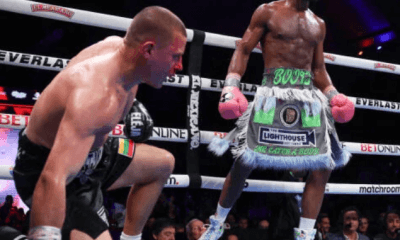
 Featured Articles4 weeks ago
Featured Articles4 weeks agoJaron ‘Boots’ Ennis Wins Welterweight Showdown in Atlantic City
-

 Featured Articles4 weeks ago
Featured Articles4 weeks agoBoxing Notes and Nuggets from Thomas Hauser
-
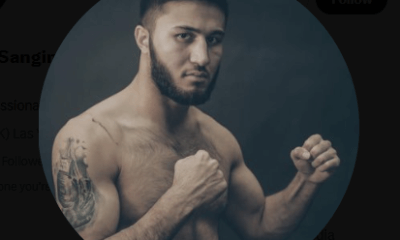
 Featured Articles4 weeks ago
Featured Articles4 weeks agoMekhrubon Sanginov, whose Heroism Nearly Proved Fatal, Returns on Saturday
-
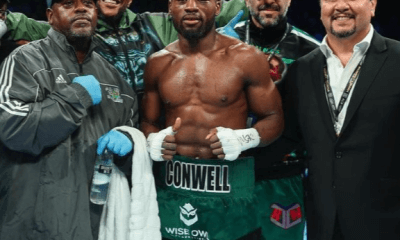
 Featured Articles3 weeks ago
Featured Articles3 weeks agoAvila Perspective, Chap. 322: Super Welterweight Week in SoCal
-
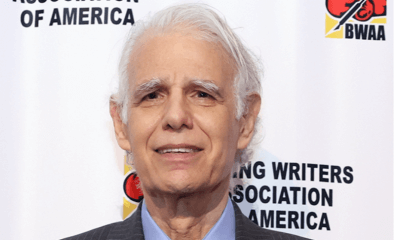
 Featured Articles4 weeks ago
Featured Articles4 weeks agoTSS Salutes Thomas Hauser and his Bernie Award Cohorts
-
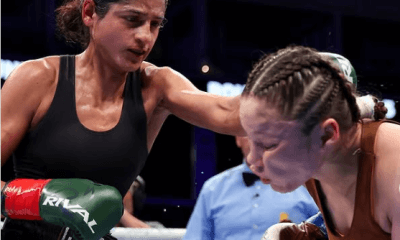
 Featured Articles3 weeks ago
Featured Articles3 weeks agoGabriela Fundora KOs Marilyn Badillo and Perez Upsets Conwell in Oceanside
-
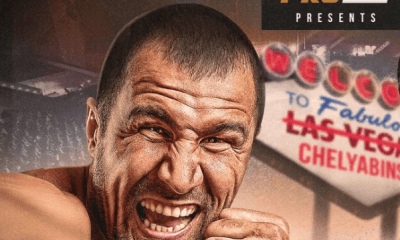
 Featured Articles3 weeks ago
Featured Articles3 weeks ago‘Krusher’ Kovalev Exits on a Winning Note: TKOs Artur Mann in his ‘Farewell Fight’
-

 Featured Articles3 weeks ago
Featured Articles3 weeks agoFloyd Mayweather has Another Phenom and his name is Curmel Moton

















